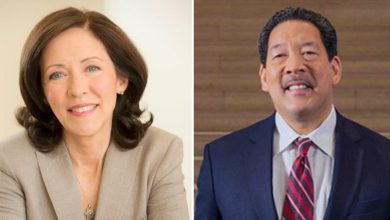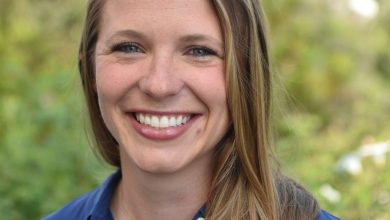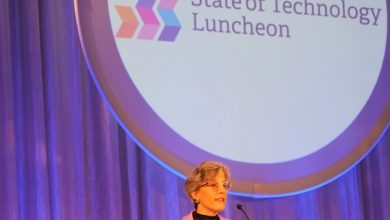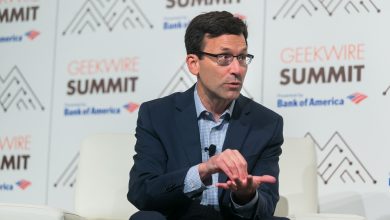Q&A with Seattle’s new financial growth chief on working with the tech trade
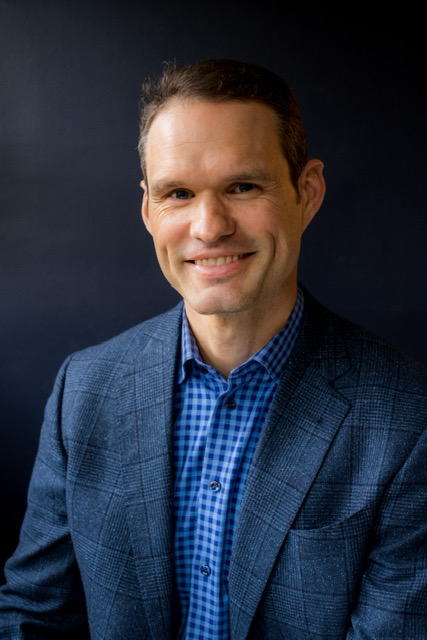
In February, Markham McIntyre agreed to leave his job as the vice president of the Seattle Chamber of Commerce to lead the Seattle’s Office of Economic Development (OED) as its new interim director.
In a city facing record economic and social upheaval, he knows he has his work cut out for him, from downtown crime and the return of workers to the thorny relationship with Amazon. Given the size of the city’s tech community, he also knows that some of the solutions to the city’s issues will be found through an improved relationship with that community.
McIntyre recently spoke with GeekWire to explain why he took the gig, what he’d like to fix first, working with the tech industry, and more. The interview was edited for brevity and clarity.
GeekWire: Why did you take the job?
Markham McIntyre: Because I deeply love this city. I’m a Seattleite born and raised. Coming from the Chamber, I have some ideas about how to improve OED. This is just an incredibly crucial moment for Seattle’s future as we come out of the pandemic and start returning to the office and start figuring out the economy, what the opportunities are, and making sure that the city is doing its best to try and make sure that Seattle continues to be an area of prosperity. It’s just an incredible opportunity for the for the city for the region, and for our residents.
What do you think the city needs to do to better communicate and innovate with the tech community?
If we can be more clear about what the city can and can’t deliver, then we can bring other partners to the table — whether it’s at the private sector through philanthropy or other kinds of public bodies — into those shared objectives and common problem solving. The city’s got to be willing to get uncomfortable in those conversations because I know there’s a lack of trust sometimes between the city and our tech community.
We’ve got to repair that trust. We’ve also got to be willing to talk about some of these thorny, difficult issues. Whether they’re social or economic, issues that don’t necessarily have easy answers or can’t be solved with a quick product or an app. Workforce diversity, wage disparities, and affordability issues. We should have those conversations and be willing for it to be a little bit messy. I think that’s going to be crucial for us to stay at the forefront of kind of the innovation economy.
Do you feel like that is a priority for the first few months in office? Or do you feel like you’re going to be more focused on post-pandemic economic recovery?
We’ve got to do both. We’ve got certain industries and certain businesses that still require some level of emergency relief and recovery type efforts. And then we’ve got some businesses and industries that made it through the pandemic much better and are well poised to take off. In the OED, we’ve got to have strategies that address both. Again, we’re not going to do that in a silo and expect that the city or this office is going to be able to do it alone. We’ve got to do that through partnerships, through communication, and through trust building with some of those other players throughout the region.
Speaking of such, some downtown companies are not bringing their workers back to the office, citing crime as a concern. Other tech companies have relocated to Bellevue, saying it’s a panacea for business. How does the Office of Economic Development respond to this? The businesses are not really speaking to problems that are specifically within your purview.
“The city’s got to be willing to get uncomfortable in those conversations because I know there’s a lack of trust sometimes between the city and our tech community.”
Economic recovery for the region and for the state won’t happen until we’ve got demonstrable improvement on the streets in downtown Seattle. Downtown Seattle is a huge economic driver for the state and to the region. And it’s really the symbol of our prosperity. Until we have progress, both on the public safety and also on issues around people experiencing homelessness, it’s going to be really hard to say that we’re recovering, or that we’re turning the corner into a city that’s thriving again.
We’re working with our partners. We’re working with the mayor’s office, the Seattle Police Department, and the Department of Neighborhoods on what we can do and how we can play a positive role. We can communicate what businesses are saying to us about what they’re hearing and what their needs are. We’ve got to get a handle both on the short-term acute problems that people are dealing with right now like broken windows for businesses and problems with public safety around the transit corridors.
But we’ve also got to stay focused on the long-term solutions about getting people more economically stable with pathways for upward mobility. I see the OED’s role as helping coordinate with those other departments that have a more direct role in public safety.
How important is it to get people back in the office in downtown Seattle?
I think it’s pretty darn important. Not just for those employers. I think it’s also important for those main-street businesses that are going to rely on foot traffic as people return to the office. Looking at it as an ecosystem, that foot traffic drives a lot of small business prosperity. Without that there, it does create a gap. I don’t know that everyone’s going to be returning to the office five days a week. We’re going to go through a little bit of a messy period as people adjust to returning to the office, and figuring out what that means for some of those main street businesses. But I think it’s vital to the future of downtown.
Let’s talk a little bit about the natural tension within the clients of your office. What is good for Amazon isn’t necessarily good for a small company and vice-versa. How do you deal with the inherent tension of serving the big tech companies in town, the skyscraper-established businesses, and the smaller ones as well?
Businesses are unique and you can’t just group them by size and assume that it really explains what their needs are or where they’re going. Different-sized businesses are going to need different things and different levels of resources. How do we help small businesses grow into mid-sized businesses? And then how do we help those mid-size businesses grow into future giants? We tend to focus a lot on startups. And we tend to focus a lot of time and energy on the big guys. There’s less attention paid to some of those folks in the middle. That’s super important and an area I’d like the OED to explore what those opportunities look like.
I’d also say that for OED, we also need to recognize that a lot of those larger businesses have staff that deal with public policy or community affairs or government affairs. A lot of the smaller businesses don’t. We’ve got to be intentional about how we bring some of those smaller businesses to the table and make sure that they have a voice in some of these economic development discussions, knowing full well that they’ve got businesses to run. And it’s not necessarily their top priority to come sit at our table. We’ve got to figure out a way to make sure that they’re included so we’re not (only dealing with) the big guys who have staff that are paid to do this stuff.
“We can’t pit our large employers against our small employers.”
What should the tech community be doing to work better with OED?
That’s a two-part answer. I think actually it does start with us, because I think the city doesn’t have great trust with our businesses generally, or the tech community specifically. I think we’ve got to figure out how to repair that trust. And I think that starts with us listening, and communicating better, who we are, who we serve, why do we serve them and how. So I think we’ve got a role to play in repairing that relationship.
But what I need from the tech community is true engagement. I would love to see more public-private partnerships, where we can actually work on some of these shared objectives, and bring to bear what the tech community does really well and bring to bear what the city does really well and play to our strengths.
Give me an example of a partnership between the city and the tech community that you think addresses an existing problem?
I’ll give you an existing partnership that I think is a good example of what I’d love to see more of: the Housing Connector organization. That’s a great example where the city and the county were having trouble interfacing with landlords because there’s a little bit of a trust issue. But the city came to the Chamber and said, “Hey, we’ve got some funding to think about how we set this up differently. Can we work together to do this?” We said yes, because we had a bit more trust with the landlords. Very quickly it became apparent that Zillow also cared deeply about this issue, and it had some technical expertise to bring to the table as well as resources.
By using the city and county funding to catalyze this new-look organization and then Zillow coming in and being able to supercharge it with both talent and their resources, it’s now housing people here locally and in Pierce County and it’s growing into potentially a national model. And it exists outside of either the city’s or Zillow’s portfolio; it spun off and now it’s a healthy organization unto itself. As I said earlier, it’s using the leverage, the resources from the city and the county, and then the expertise from Zillow to build something that’s durable and can scale up.
Would you like to see the tech community also identify those partnership areas, or do you feel like that’s OED’s job?
I think there’s this weird thing in Seattle, where the tech community gets kind of “othered.” And the reality is, I’m pretty sure the tech community wants what most Seattleites want, which is high functioning governments, beautiful and safe neighborhoods, lots of lovely restaurants and kind of vibrancy to the city. I think there’s a huge opportunity, there’s plenty of shared objectives that we could find.
Conclusion: So above is the Q&A with Seattle’s new financial growth chief on working with the tech trade article. Hopefully with this article you can help you in life, always follow and read our good articles on the website: Doshared.com

